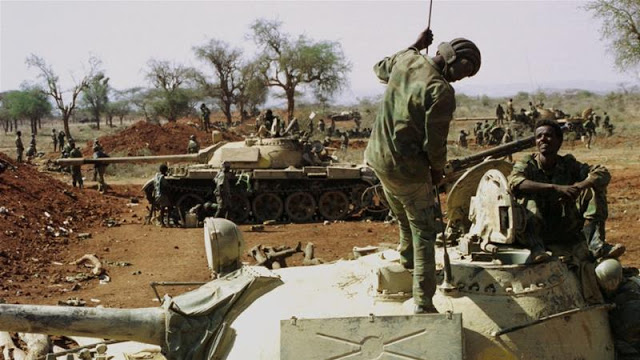In a nationally televised speech
marking Martyrs’ Day, President Isaias Afwerki said, “We will send a delegation
to Addis Ababa to gauge current developments directly and in depth as well as
to chart out a plan for continuous future action. The Eritrean people, but also
the Ethiopian people, have lost an opportunity of two generations for over half
a century.” Two weeks ago Ethiopia made the surprise announcement that it was
ready to accept a nearly 20-year-old peace deal. Tensions flared between the
former allies over the border demarcation of the remote town of Badme, turning
into a full-scale war in 1998. The fighting raged for two years and claimed at
least 70,000 lives and it is very much in Eritrea’s interest to
accept.
marking Martyrs’ Day, President Isaias Afwerki said, “We will send a delegation
to Addis Ababa to gauge current developments directly and in depth as well as
to chart out a plan for continuous future action. The Eritrean people, but also
the Ethiopian people, have lost an opportunity of two generations for over half
a century.” Two weeks ago Ethiopia made the surprise announcement that it was
ready to accept a nearly 20-year-old peace deal. Tensions flared between the
former allies over the border demarcation of the remote town of Badme, turning
into a full-scale war in 1998. The fighting raged for two years and claimed at
least 70,000 lives and it is very much in Eritrea’s interest to
accept.
The two-year war between Eritrea and Ethiopia killed an
estimated 100,000 people. In this file photo from 1999, Eritrean forces are
seen near the Belesse front line, preparing for battle [Reuters]
estimated 100,000 people. In this file photo from 1999, Eritrean forces are
seen near the Belesse front line, preparing for battle [Reuters]
It has been 18 years since Ethiopia and Eritea signed the Algiers Peace
Accord that officially ended the 1998-2000 war, which killed an estimated
100,000, displaced more than a million, and splintered thousands of families.
Accord that officially ended the 1998-2000 war, which killed an estimated
100,000, displaced more than a million, and splintered thousands of families.
The Accord, brokered by the African Union, the United Nations and the United
States, was not designed merely to end one of the most senseless and
deadliest conflicts in the world. It was also meant to iron out the underlying
issues and pave the way for peaceful co-existence between the two nations.
Nearly two decades on, however, the two countries are still at loggerheads and
see each other as the number one geopolitical threat that they face.
States, was not designed merely to end one of the most senseless and
deadliest conflicts in the world. It was also meant to iron out the underlying
issues and pave the way for peaceful co-existence between the two nations.
Nearly two decades on, however, the two countries are still at loggerheads and
see each other as the number one geopolitical threat that they face.
On June 5, the Ethiopian government announced its readiness to fully comply and implement
the Algiers Peace Accord, an agreement it refused to comply with for 18
years. It also said that it will accept the outcome of a 2002 border
commission ruling, which awarded disputed territories, including the town of
Badme, to Eritrea.
the Algiers Peace Accord, an agreement it refused to comply with for 18
years. It also said that it will accept the outcome of a 2002 border
commission ruling, which awarded disputed territories, including the town of
Badme, to Eritrea.
Why now and what does this mean for the future of the two countries and the
region?
region?





